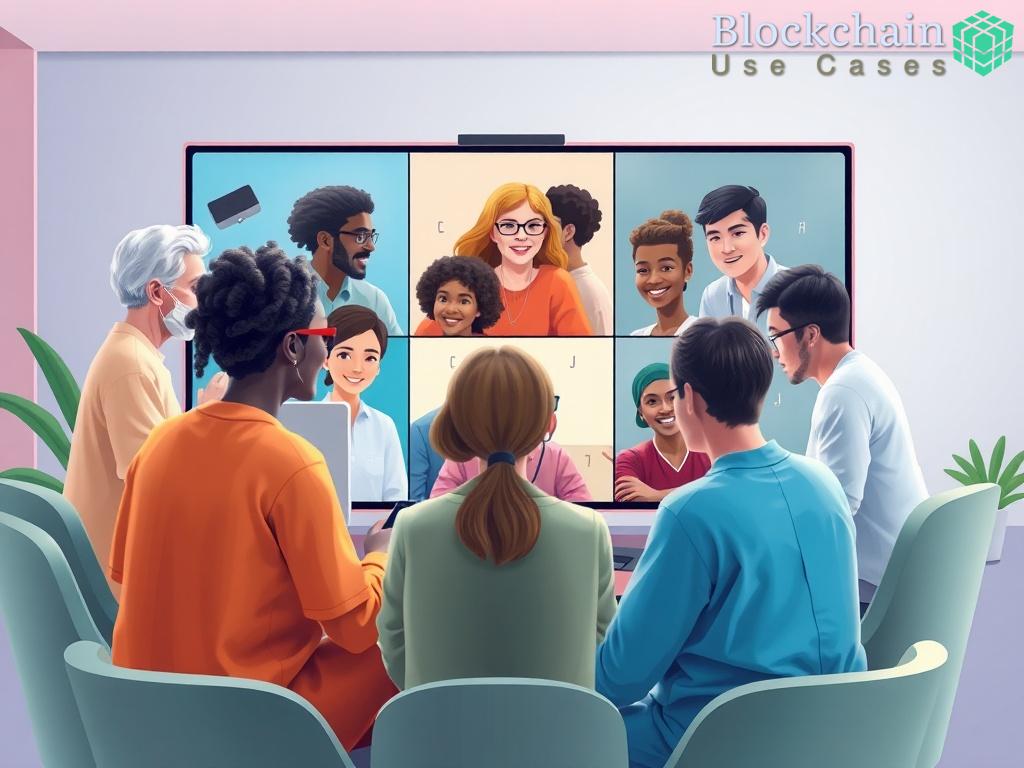Benefits of Decentralized Patient Support Platforms
Empowering Patients Through Decentralization
Decentralized platforms for patient support groups are revolutionizing the way individuals connect, share experiences, and seek assistance. Unlike traditional platforms that rely on centralized control, these innovative solutions distribute power among users, fostering a more equitable environment. This shift not only enhances engagement but also ensures that patient voices are prioritized, leading to more relevant support and resources.
Enhanced Privacy and Security
One of the most compelling benefits of decentralized patient support platforms is the heightened level of privacy and security they offer. By minimizing reliance on central servers, these platforms reduce the risks associated with data breaches and unauthorized access. Patients can share their health journeys without the fear of their information being misused, thus fostering a trusting environment.
Dynamic and Diverse Community Building
Decentralized platforms promote the establishment of dynamic and diverse communities. The openness of these systems allows for the inclusion of varied voices and experiences, facilitating a richer exchange of information. Patients from different backgrounds can connect over shared challenges, providing support that is both empathetic and informed. Below is a summary of how decentralized platforms enhance community engagement:
- Inclusivity: Bringing together patients from diverse demographics.
- Flexibility: Adapting to the needs of the community in real-time.
- Resource Sharing: Distributing knowledge and support equally among members.
- Peer Support: Facilitating connections that lead to lasting friendships.
Technological Frameworks for Decentralized Management
The emergence of decentralized platforms for patient support group management has been significantly driven by advanced technological frameworks. These frameworks not only facilitate smoother interactions between users but also enhance the overall functionality and security of patient support networks. By leveraging distributed technologies such as blockchain and peer-to-peer networking, these platforms are redefining how patient communities operate, ensuring that they are more resilient, transparent, and user-centric.
Blockchain: The Backbone of Decentralization
At the heart of many decentralized patient support platforms lies blockchain technology. This innovative framework allows for secure, transparent transactions that do not require a central authority. By employing blockchain, patient data can be stored in a distributed ledger that is immutable and accessible only to authorized users. This greatly enhances data integrity and ensures that patients have control over their personal health information. The use of smart contracts within blockchain systems also automates various processes, reducing administrative burdens and allowing for real-time updates on group activities.
Peer-to-Peer Networking: Facilitating Direct Connections
Complementing blockchain technology is the implementation of peer-to-peer (P2P) networking. This framework enables patients to connect directly with one another without the need for intermediaries. By facilitating direct communication, P2P networks enhance the sense of community and allow for the immediate sharing of resources and experiences. Furthermore, P2P systems adapt dynamically to user needs, enabling the platform to scale effectively as the community grows. This adaptability ensures a consistent level of engagement and support among members, fostering a vibrant ecosystem where patients can thrive.
Integrating AI for Enhanced User Experience
Another significant aspect of the technological framework for decentralized management is the integration of artificial intelligence (AI). AI algorithms can analyze user interactions and feedback to tailor the support experience to individual needs. This personalized approach not only improves user satisfaction but also optimizes resource allocation within the platform. By employing AI, decentralized patient support groups can anticipate the needs of their members, ensuring that relevant information and assistance are always available. The combination of blockchain, P2P networking, and AI creates a robust environment that empowers patients while maintaining the highest standards of security and privacy.
Challenges in Implementing Decentralized Patient Groups
As decentralized patient support groups gain traction, they bring forth an array of advantages that empower individuals in their health journeys. However, the transition to these innovative platforms is not without its hurdles. Understanding these challenges is crucial for stakeholders aiming to harness the full potential of decentralized management.
Technical Barriers to Adoption
One of the primary challenges faced by decentralized patient support groups is the technical complexity associated with the implementation of blockchain and peer-to-peer technologies. Many potential users, especially those from older demographics, may find it difficult to navigate these platforms, leading to a significant digital divide. The learning curve is often steep, and without adequate training and resources, users may struggle to engage effectively. This gap can inhibit the growth of communities that thrive on active participation, thus undermining the intended benefits of decentralization.
Governance and Moderation Dilemmas
Another significant obstacle lies in the area of governance and community moderation. In traditional platforms, centralized authorities often manage content and user behavior, ensuring compliance with community standards. However, decentralized platforms operate differently, where the absence of a central authority can lead to challenges in maintaining a safe and respectful environment. The potential for misinformation and harmful content increases, as there are fewer checks and balances. Communities must establish robust frameworks for governance that empower users while safeguarding against potential abuses and conflicts.
Privacy and Security Concerns
Although decentralized platforms are designed to enhance privacy and security, they are not immune to risks. Users must navigate complex privacy settings and understand how their data is managed. Furthermore, the lack of centralized control can make it harder to respond to security breaches effectively. Patients may hesitate to share sensitive information, fearing that their data could still be compromised. Therefore, fostering trust becomes essential, requiring transparent policies and proactive measures to protect user data. Establishing a culture of security awareness among users is vital to mitigate these concerns.
Case Studies of Successful Decentralized Support Initiatives
Innovative Approaches in Patient Empowerment
The landscape of healthcare is witnessing a remarkable transformation, driven by the advent of decentralized platforms that foster community and support among patients. These initiatives have emerged as beacons of hope, demonstrating how technology can be harnessed to improve patient experiences. By examining various case studies, we uncover the unique methodologies employed by these platforms, highlighting their effectiveness in addressing the needs of diverse patient populations.
Pioneering Success Stories
One notable example is HealthConnect, a decentralized platform that leverages blockchain technology to create a secure network for patients with chronic illnesses. Through this initiative, patients can share their health data while maintaining complete control over their personal information. The platform not only facilitates peer-to-peer support but also connects users with healthcare professionals who can provide tailored advice. This dual approach has led to improved health outcomes and increased patient satisfaction, demonstrating that decentralization can enhance the overall healthcare experience.
Another compelling case is PeerHealth, which focuses on mental health support. Utilizing a decentralized model, PeerHealth creates a safe space for individuals grappling with mental health challenges. The platform employs AI algorithms to match users with similar experiences, fostering connections that transcend geographical boundaries. This initiative has proven particularly beneficial during the pandemic, as it offers users a sense of belonging and understanding, critical elements often lacking in traditional support systems.
Transformative Impact on Patient Communities
The outcomes of these decentralized platforms are profound, as they not only empower patients but also cultivate a sense of community. The dynamic nature of these initiatives allows for continuous feedback and adaptation, ensuring that the support provided is relevant and timely. By sharing their experiences, patients contribute to a collective knowledge base that benefits the entire community. Moreover, the inclusion of diverse voices leads to richer discussions and innovative solutions to shared challenges.
In summary, as more patients embrace decentralized platforms for support, the potential for transformation in healthcare becomes clearer. These case studies exemplify the success of such initiatives, showcasing their ability to enhance privacy, foster connections, and empower individuals in their health journeys. The future of patient support lies in these innovative approaches, and as technology continues to evolve, so too will the opportunities for decentralized collaboration in healthcare.
Future Trends in Decentralized Patient Engagement
Embracing Artificial Intelligence for Enhanced Interactions
The integration of artificial intelligence (AI) in decentralized patient engagement platforms is poised to reshape how individuals interact and receive support. As AI technologies evolve, they will enable more personalized experiences by analyzing user behavior and preferences. This will not only enhance communication but also ensure that relevant resources are readily available to users. Furthermore, AI can facilitate predictive analytics, allowing platforms to foresee emerging trends and adapt accordingly, thereby creating a proactive support environment.
Interoperability: Bridging Diverse Healthcare Systems
A significant trend in the future of decentralized patient engagement is the push towards interoperability among various healthcare systems. By facilitating seamless data exchange between different platforms, patients will have a comprehensive view of their health information. This interconnectedness will empower users to make informed decisions about their care, while also fostering collaboration among healthcare providers. The ability to share data across systems securely will enhance the overall patient experience, promoting a more integrated approach to health management.
Emerging Trends: A Look Ahead
As we look to the future, several trends are set to redefine decentralized patient engagement:
- Increased Adoption of Blockchain Solutions: The transparency and security offered by blockchain technology will drive its widespread adoption in patient support platforms.
- Focus on User-Centric Design: Platforms will increasingly prioritize user experience, ensuring that interfaces are intuitive and accessible to all demographics.
- Community-Driven Initiatives: The empowerment of patients to contribute to platform governance will lead to more democratic and responsive support systems.
- Integration of Wearable Technology: As wearable devices gain popularity, their data will be integrated into decentralized platforms, providing real-time insights into user health.
In summary, the future of decentralized patient engagement is bright, characterized by technological advancements that prioritize patient empowerment and community building. As these trends materialize, they will pave the way for a more inclusive and responsive healthcare ecosystem.





